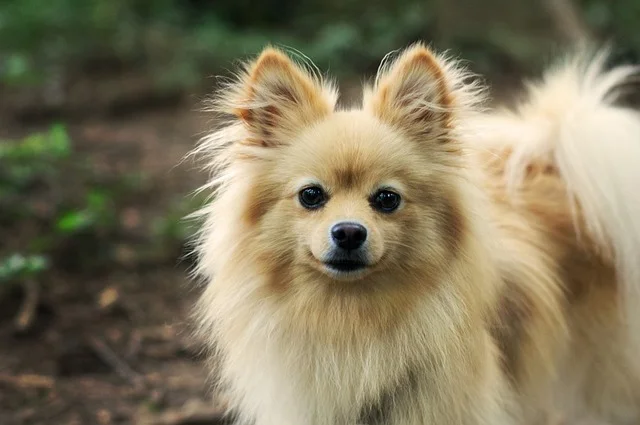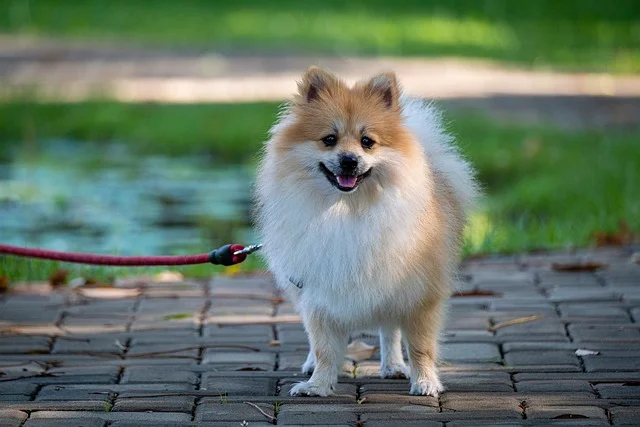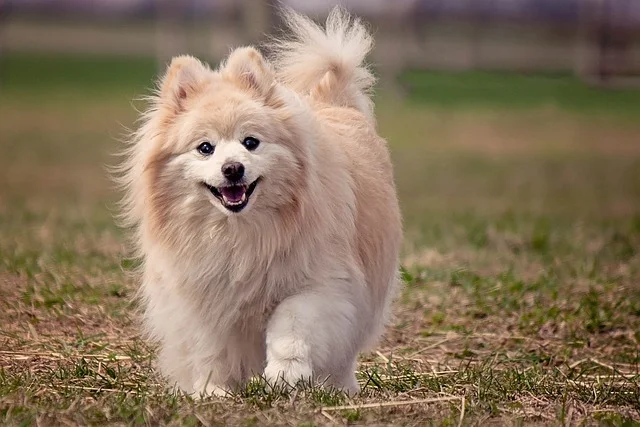The Pomeranian, commonly known as the Pomeranian dog, is a small and lively breed that captures hearts worldwide. In this article, we will explore the history, characteristics, care, and training of Pomeranians, including information on Pomeranian puppies. Get ready to discover the charm of this cute and energetic companion!
History of the Pomeranian
The Pomeranian breed, originating from Pomerania, has a fascinating history. These small dogs were initially larger and used for various tasks, like herding. Over time, they were selectively bred to their current size, making them even more appealing and charming as pets.
Appearance and Size

Pomeranians are known for their compact size and charming appearance. They are small dogs, typically weighing between 3 to 7 pounds, with a height of 6 to 7 inches at the shoulder. Their adorable features include a fox-like face, expressive eyes, small ears, and a fluffy tail that curls over their back. Pomeranians come in various colors, such as white, black, and more.
Temperament and Personality
Pomeranians have a lively and friendly temperament, making them delightful companions. They are intelligent and love being the center of attention. These dogs are known for their confidence and fearlessness, which sometimes makes them act like bigger dogs. Pomeranians are affectionate with their owners, forming strong bonds and bringing joy to any household.
Health Considerations
When it comes to health, Pomeranians may have specific considerations. It’s important to be aware of potential dental issues, patellar luxation, collapsed trachea, and eye problems like cataracts. Regular veterinary check-ups and a balanced diet are important for maintaining their overall well-being.
Grooming and Coat Care
Pomeranians have a beautiful double coat that requires regular grooming. Daily brushing helps prevent matting and keeps their coat clean. They also need regular bathing, nail trimming, and teeth brushing. It’s worth mentioning that Pomeranians do shed, so expect some loose hair around the house.
Exercise and Activity Needs

Despite their small size, Pomeranians have the energy to burn. Daily exercise, including walks and playtime, is essential to keep them happy and healthy. It’s important to consider their sensitivity to extreme temperatures, as they may be affected by heat or cold due to their size.
Training and Socialization
Pomeranians are intelligent and eager to please, making them trainable companions. Positive reinforcement methods work best when teaching them obedience and basic commands. Early socialization is also vital to helping them become well-rounded and friendly dogs.
Feeding and Nutrition
A balanced and nutritious diet is vital for the overall health of Pomeranians. Providing them with high-quality dog food suitable for their size and age is essential. Consult with your veterinarian to determine the right portion sizes and feeding schedule for your Pomeranian to ensure optimal health.
Common Behavioral Traits
Pomeranians have alert and protective natures, often making them good watchdogs. They may bark to alert their owners of any potential dangers. However, excessive barking can be managed through proper training and providing appropriate outlets for their energy.
Pomeranian as a Family Pet

Pomeranians can make wonderful family pets, but due to their small size, they may be better suited for households without very young children. They can be delicate and may easily get injured if mishandled. Supervision and teaching children how to interact gently with the dog are essential for a safe and harmonious environment.
Choosing a Pomeranian Puppy
If you’re considering adding a Pomeranian puppy to your family, it’s important to find a reputable breeder. Spend time with the puppy to observe its behavior and ensure proper socialization. Vaccinations and veterinary care are vital for the puppy’s well-being and future health.
Pomeranian Rescue and Adoption
Adopting a Pomeranian can be a rewarding experience. There are rescue organizations and shelters specializing in Pomeranian or small-breed dogs. Giving a loving home to a rescued pomeranian provides them with a second chance and can bring immense joy to both you and your new furry friend.
Frequently Asked Questions
Are Pomeranians good with children?
Pomeranians can be good with children, but supervision and teaching children to handle them gently are essential due to their small size.
Do Pomeranians require a lot of exercise?
While Pomeranians have the energy to burn, they don’t require excessive exercise. Regular walks and playtime are usually enough to keep them happy.
Are Pomeranians hypoallergenic?
No, Pomeranians are not hypoallergenic. They do shed, although their small size may result in fewer allergens compared to larger breeds.
Can Pomeranians be left alone for long periods of time?
Pomeranians are social dogs and prefer not to be left alone for extended periods. They thrive in the company of their owners.
Are Pomeranians easy to train?
Pomeranians are intelligent and eager to please, making them relatively easy to train using positive reinforcement methods.
Are Pomeranians good pets?
Yes, Pomeranians make wonderful pets. They are lively, affectionate, and love being the center of attention. Their small size and friendly nature make them suitable for various households, including families and individuals.
Are Pomeranians expensive?
The cost of a Pomeranian can vary depending on various factors, such as pedigree, breeder reputation, and location. Generally, Pomeranians are considered a moderately expensive breed due to their popularity and demand.
How long will a Pomeranian dog live?
On average, Pomeranians have a lifespan of 12 to 16 years. With proper care, a healthy Pomeranian can live a long and fulfilling life, providing companionship for many years.
Are Pomeranians cats or dogs?
Pomeranians are dogs, not cats. They belong to the dog family and share all the characteristics of a typical dog, such as barking, wagging their tails, and displaying dog-like behaviors.
Conclusion
Pomeranians are adorable and energetic companions, bringing joy and love to their owners. Understanding their history, characteristics, and care requirements is important for providing them with a happy and fulfilling life. Whether you choose a Pomeranian puppy or adopt a rescued dog, the bond you’ll develop with these lovable creatures is sure to be unforgettable.






